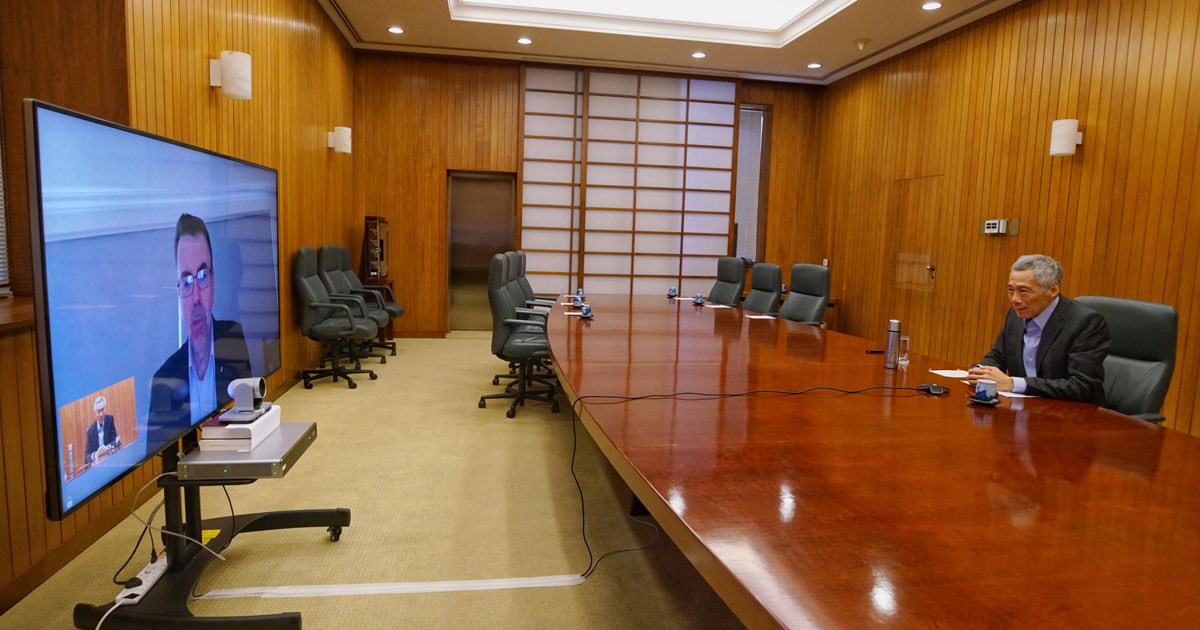Prime Minister Lee Hsien Loong gave an interview to The Australian newspaper via Skype on March 20, 2020.
The interview naturally covered the Covid-19 topic, as PM Lee was quizzed about Singapore's success at handling the outbreak, the country's internationally recognised efforts at hindering the spread of the virus, as well as the reckoning that will come post-Covid-19 outbreak.
Regarding this last topic, PM Lee was asked if there will be a rethinking of the current global order in terms of movement of goods and people, and the likelihood of nations to be more self-reliant.
PM Lee's extended comments are provided below in full, adapted from the full interview transcript:
Has globalisation gone too far?
The Australian: Prime Minister, just trying to look ahead a bit. Do you think that this crisis does make people wonder whether elements, not the whole thing, but elements of globalisation, maybe have gone a bit too far – like having very concentrated supply chains being dependent on one supply chain? Would countries will want to be a bit more resilient, and have more of their own capacity? Secondly, will it have long term implications for the free movement of people?
PM: I am sure that there will be. Certainly, the logical extreme of a completely borderless world, where goods and people can move freely, and you do not mind being completely dependent on one source for important things, whether it is drugs or electronics, or for that matter, food, is going to come under very searching scrutiny.
I mean even Singapore will have to ask ourselves, in a crisis, what will we be short of? Masks in this crisis, but in another crisis, it may be something else. Certainly, you have to ask whether your food supplies are secure. Then you have to ask, what is it which I can do to secure myself? Because I cannot go back to a situation of autarky. So you need some diversification, you need some fire breaks, you need some checks on movements of people.
And yet I do not think we want to go back to a situation where you disconnect ourselves completely. Even in 1917 and 1918, in the global flu pandemic, there was not that degree of globalisation then and yet it swept the world. So to shut yourself off and hope to become impregnable, I do not think it is a realistic approach.
The Australian: No, indeed. Now, I am sure you are right, Prime Minister. Today, as you say, some scrutiny of the management of how diverse your supply chains are and what resilience you have.
PM: So I think you will want diversification, but I do not think that is the same thing as bifurcation.
How will China-US tensions play out?
The Australian: No, indeed. Well, on that very question of diversification versus bifurcation, perhaps I could ask you about a different topic, but very related. The China-US trade tensions that we have seen over the last year or two, have had all kinds of consequences. People have diversified, some companies have diversified out of China, there has been a bit of a slowing in the China-US trade. That is all affected by this Covid-19, but how are you feeling about those trends generally? Do you think they were on the way towards a resolution or were they getting a bit worse or what was your view of that?
PM: I think they have temporarily come off the boil, with the first package of measures – the first agreement between the Chinese and the Americans, which had some Chinese commitments and the Americans held off from some further tariff measures, so the business picked up again. But many difficult issues have not been addressed, and I think the fundamental strategic tension between the two in their perspectives of how they each stand in the world and how they see their relationship, has not reached a resolution.
You will always have a tension in it, but at least some mutual understanding of each other's position, and what is a way forward which will acknowledge that tension, but enable the two countries to work constructively together in a wide range of areas, and stably. I think that has not been resolved, it is on ice for now because both countries are preoccupied with the Covid-19 virus. But that problem will come back, whoever wins the presidential election in the US.
Top photo by Ministry of Communications and Information
If you like what you read, follow us on Facebook, Instagram, Twitter and Telegram to get the latest updates.
